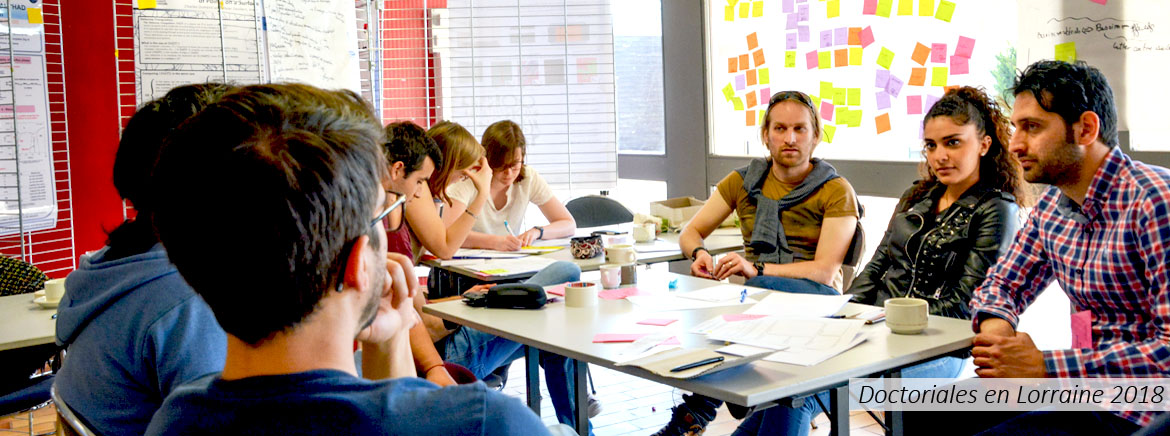Apply for a PhD

Funding programs
Funding programs
There are many ways of funding a thesis, some of which can be combined. The PhD student’s funding over the course of the thesis period is one of the basic principles laid down in the Doctoral Charter. However, depending on the discipline, it is not always possible for the research teams hosting PhD students to provide them with funding, which is why, in some fields, many PhD students have a main job.
Although certain thesis subjects are proposed together with funding, this is by no means automatic and thesis applicants may be required to identify potential funding themselves.
Before seeking funding for your doctorate, check whether the Doctoral School of your interest requires a minimum funding rate to enable you to enroll.
- Funding proposed by the UL
-
- Establishment doctoral contracts
Obtaining an establishment doctoral contract is subject to a call for candidates disseminated by Doctoral Schools, Laboratory Directors and research organisations, usually in the spring prior to the first year of the PhD course.
- Doctoral contracts funded by laboratories
You can approach a research team directly to find out what subjects are available and apply with a view to obtaining a doctoral contract. The list of laboratories can be found on univ-lorraine.fr. When you contact a laboratory, please attach your CV and a letter of motivation to your request.
- LUE doctoral contracts
The Lorraine Université d’Excellence initiative (LUE), proposed as part of the “IDEX/I-SITE” call for projects, includes programmes aimed at future PhDs students, including recruitment under LUE doctoral contracts.
- Doctoral contracts co-funded by the Lorraine region
The Grand Est region cofinances up to 50% of theses proposed by the University of Lorraine and major research organisations (CNRS, INRA, INRIA and INSERM), over three years.
An application for thesis cofinancing must be made to the Grand Est region by the University (following the Scientific Council’s approval) or research organisation, depending on the host laboratory’s initial request. The Region disseminates the annual call for tender among establishments in the autumn preceding the university year concerned. For full information, please contact your future host laboratory. - Funding through research organisation contracts
-
Most French research laboratories, EPST (CNRS, INRIA, IRD, etc.) and EPIC (CEA, IRSN, CNES, etc.) also fund thesis projects in the form of doctoral contracts or research contracts. There are also other sources of thesis funding proposed by research foundations and associations (FRM, AFM, Ligue contre le Cancer, l'Oréal, etc.).
- Corporate funding
-
Industrial Contracts for Training through Research (CIFRE – Conventions industrielles de Formation par la REcherche) enable you to complete your thesis while working for a company and benefiting from academic support. It is therefore an association between three partners: a PhD student, a company and a research unit attached to the University
For more information:
• Consult the ANRT (Association nationale de recherche et de technologie - National Research and Technology Association) website.
• View the ANRT’s CIFRE sheet
• Contact the Sous-Direction de la Valorisation et de l'Innovation (SDVI - Promotion and Innovation Division) - Funding linked to international mobility
-
In some cases, these types of funding can cover the duration of your PhD or, more frequently, finance a trip abroad during the thesis. Some countries have set up PhD funding programmes: ProFas B+ in Algeria, Conacyt in Mexico, China Scholarship Council for China, etc.
For more information, you can consult our page dedicated to international mobility or go to your country of origin’s Campus France space. - Other possible sources of funding during the thesis
-
You can also take a paid job to fund your thesis:
- In teaching:
- By becoming an ATER. Becoming an Attaché temporaire d‘enseignement et de recherche (Temporary Teaching and Research Assistant) enables you to prepare a thesis or sit for the higher education recruitment competitive examination while teaching as a contract employee. You will be required to teach 128 hours of classes or 192 hours of tutorials or 288 hours of practical work per year or any equivalent combination. It is possible to work as an ATER on a part-time basis. However, teaching duties cannot be less than 64 hours of classes, 96 hours of tutorials or 144 hours of practical work per year or any equivalent combination.
Whatever the case, ATERs participate in the various obligations involved in their teaching activity: supervision of students, testing of knowledge and examinations - By working on a temporary teaching basis in a university.
- By becoming an ATER. Becoming an Attaché temporaire d‘enseignement et de recherche (Temporary Teaching and Research Assistant) enables you to prepare a thesis or sit for the higher education recruitment competitive examination while teaching as a contract employee. You will be required to teach 128 hours of classes or 192 hours of tutorials or 288 hours of practical work per year or any equivalent combination. It is possible to work as an ATER on a part-time basis. However, teaching duties cannot be less than 64 hours of classes, 96 hours of tutorials or 144 hours of practical work per year or any equivalent combination.
- In any other filed of activity. If the PhD is not prepared on a full-time basis, length of the preparation may be six years at the most.
- In teaching:
![]() This page features the list of the most frequent funding methods: However, other funding sources corresponding to your project may exist.
This page features the list of the most frequent funding methods: However, other funding sources corresponding to your project may exist.


